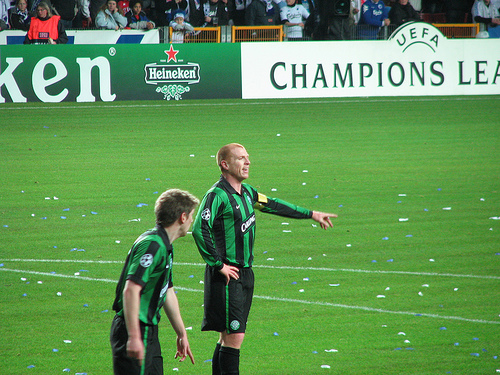So, the TV company go to mainland Europe and get people to rate them for outrageousness. 0 being “the referee was absolutely right”, 10 being “that goal in a Watford game that was well past the post”. The volunteer is shown a clip at random, and asked to rate it. this is repeated till they get fed up. If a Falkirk incident against Hibs is given a 10, Falkirk are given 10 points, and Hibs lose 10 and each have their “incidents voted on” increased by one.
After lots and lots of ratings, each team’s average number of points per incidents voted on is put in to a league table. those at the top are the teams most sinned against, and those at the bottom, those most favoured.
For people to do the rating, I would think people at five-a-side centres would do, but if you want to increase the newsworthiness, maybe people taking UEFA coaching classes would be better. but less likely to volunteer, perhaps. foreign referees would probably still back the referee, but having them as a different sample might be interesting too. This would of course involve people in said TV company going on a trip to Europe, but I don’t think that should be a problem, somehow.
The results would lead to lots of discussion and hits on the relevant website I’m sure, and would actually add to the sum of human knowledge. in short, it would be a bit like hotornot.com for refereeing decisions. dallasorgallus if you will.
Until some sort of scientific measurement is attempted by the media, the words “paranoia” and “conspiracy theory” should be stricken from lexicon.
League Season Simulator
Too many things that are contentious in Scottish football are unnecessarily decided behind closed doors. This gives the impression that there are no clear rules and that decisions are open to influence. For example, who will play when, who the officials will be, and whether the season will be extended.
The rules associated with this may be complex. The weather and other postponements, the police, the TV companies, the standings at the time of the split and Scottish teams’ participation in Europe. However if this isn’t so complex that George Peat or Neil Doncaster can’t get their head around it in a meeting, then it’s not so complex that a computer can’t model those rules and apply them impartially.
Rules might include “If a team gets to a European final the league will be extended by a week”.
Anyone should be able to go to the SPL website and say “if the teams are in these positions at the break what will happen” and see exactly when all the games will be played. “If the following game is postponed, when will it be replayed, and who will referee it?”.
This would stop arguments about who plays when after the split, which referees are selected for big (and small) games, and whether the league is extended, without reference to which clubs are involved. This would remove the cloud of suspicion that the decisions are influenced by begging through the press.
The Clypatron 3000
Although the police have arrested a few people for online hate crimes related to football, these represent a tiny percentage of the incidents on the web. This has led to fans forming posses (or crowd-sourcing justice) to expose the culprits in other ways. This could increase the number of prosecutions, but has downsides.
Although this often done in a responsible way, I think that when carried out more widely, any method that doesn’t involve the police will be dangerous. There is always the danger of vigilantes publishing addresses, which is wrong if the person is guilty and the address is correct, and even more wrong if mistakes are made. So I’ve been thinking about a realistic way in which members of the public could interact with the police which wouldn’t lead to a slew of tit-for-tat vexatious allegations that would lead to the police ignoring them all. If it’s a free-for-all, I can imagine some sites initiating a campaign to report anyone who has ever said “hun”, for example.
So I think there there should be a web interface where people can register, and be background-checked by the police. The police can then work out how many allegations they can handle in a week and set a capacity for how many allegations can be made by each user. Initially these would be spread equally over all the registered users, but the police can rate the quality of allegation so that those who do well (in terms of seriousness of allegation and evidence provided) are allowed to make more allegations, and others fewer allegations.
The police would have to provide clear guidelines on what they wanted to be told about, and the kind of evidence that should, and shouldn’t, be gathered. the total capacity for allegations would also be a measurement of how seriously the police are taking the problem.
The chances are Celtic fans would mostly just report Rangers fans and vice versa, but as long as those in question were guilty, I would have no problem with that.





